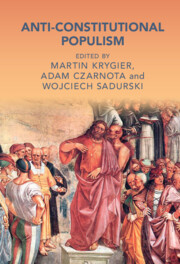Book contents
- Anti-Constitutional Populism
- Cambridge Studies in Law and Society
- Anti-Constitutional Populism
- Copyright page
- Contents
- Figures
- Contributors
- Acknowledgements
- Introduction: Anti-Constitutional Populism
- I Populisms
- II Courts
- Chapter 5 Populism, Constitutional Democracy, and High Courts – Lessons from the Venezuelan Case
- Chapter 6 When Bolsonaro and the Judges Go Shopping – How Brazil’s Legal Elites Opened the Door for Bolsonaro’s Bad Populism
- Chapter 7 Disarming the Guardians – the Transformation of the Hungarian Constitutional Court After 2010
- III Anti-Constitutionalism After Post-Communism
- IV Eu Responses
- V Concluding Reflections
- Index
- Cambridge Studies in Law and Society
- References
Chapter 7 - Disarming the Guardians – the Transformation of the Hungarian Constitutional Court After 2010
from II - Courts
Published online by Cambridge University Press: 24 March 2022
- Anti-Constitutional Populism
- Cambridge Studies in Law and Society
- Anti-Constitutional Populism
- Copyright page
- Contents
- Figures
- Contributors
- Acknowledgements
- Introduction: Anti-Constitutional Populism
- I Populisms
- II Courts
- Chapter 5 Populism, Constitutional Democracy, and High Courts – Lessons from the Venezuelan Case
- Chapter 6 When Bolsonaro and the Judges Go Shopping – How Brazil’s Legal Elites Opened the Door for Bolsonaro’s Bad Populism
- Chapter 7 Disarming the Guardians – the Transformation of the Hungarian Constitutional Court After 2010
- III Anti-Constitutionalism After Post-Communism
- IV Eu Responses
- V Concluding Reflections
- Index
- Cambridge Studies in Law and Society
- References
Summary
As a result of the democratic transitions at the end of the 1980s, constitutional courts became crucial institutions in the constitutional systems of Central and Eastern Europe. As Wojciech Sadurski emphasises, while the effectiveness of these tribunals varies, they have made a strong mark on the process of constitutional transition.1 In the next decades, constitutional courts themselves, or their doctrinal supporters and commentators, did not have to defend their position in terms of its legitimacy in a democracy; such legitimacy was assumed rather than contested and debated.2 However, there have been cases of constitutional courts in the region under political attack from the other branches of government, especially from the executive, and ‘so it must be observed that the exalted position of the constitutional courts within domestic political systems is never particularly stable’.3
- Type
- Chapter
- Information
- Anti-Constitutional Populism , pp. 254 - 294Publisher: Cambridge University PressPrint publication year: 2022
References
- 4
- Cited by



